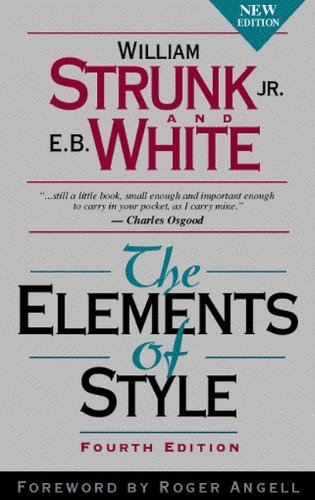Ten Words on Simplicity in Writing and Life
/I like the idea of simplicity even more than I like the practice of it. This is probably the case for most of us. In our super-complex modern world, every step toward simplicity feels like a leap. But it's a leap worth taking, and especially for writers.
In his classic book Celebration of Discipline, Richard Foster presents a beautiful description of simplicity. He also describes ten principles to help us understand what simplicity means today. These repeatedly reminded me of Strunk & White's The Elements of Style. The connection is that simplicity in life helps us write with the unique force of simple words. As Strunk & White put it, "style is the writer, and therefore what you are, rather than what you know, will at last determine your style."
Here I boil down Foster's ten ideas for simplicity and tie them to Strunk & White's timeless lessons on writing.
1. Usefulness
Foster says, "Buy things for their usefulness rather than their status." His example about clothes is poignant: "Stop trying to impress people with your clothes and impress them with your life."
Strunk & White say, "Avoid fancy words." This is subjective, of course. But maybe if you're tempted to use a fancy word, ask yourself why. If you think it sounds smart, if you think it's impressive, then change it. "Do not be tempted by a twenty-dollar word when there is a ten-center handy, ready and able."
2. Freedom
Foster says, "Reject anything that is producing an addiction in you." This isn't just crack cocaine. It might be Netflix binge watching. Is there something you feel compelled to do frequently, almost uncontrollably? That's not freedom, that's slavery.
We can also become addicted to words. What styles and phrases enslave your writing? Are there certain metaphors or similes that keep cropping up on every page? They are not a help, they are a crutch. Be free of these things. A good insight from Strunk & White: "Use figures of speech sparingly." The less you use them, the freer you'll be. Write freely, write simply.
3. Giving
Foster says, "If you find that you are becoming attached to some possession, consider giving it to someone who needs it."
Give in your writing, too. Here we should heed Strunk & White's advice to "put statements in positive form," because "the reader is dissatisfied with being told only what is not; the reader wishes to be told what is." Writing that only denies cannot create, and creation is at heart of writing. The writer must offer something new into the world.
4. Tech-skeptic
Foster says, "Refuse to be propagandized by the custodians of modern gadgetry." Does that mean we can’t use iPhones? I doubt it. But does it mean we shouldn’t wait in line for the newest iPhone? Yes.
Strunk & White say, "Prefer the standard to the offbeat." And by "offbeat" they mean "the beat of new vocabularies" in the "living stream" of language. Just as we’ll be simpler by resisting the urge to have all the latest technology, we’ll write more simply if we avoid the latest hot words.
But dude, can we still say “cool”? Sure, if we do so carefully, intentionally. Strunk & White get to the heart of it: "there is simply a better chance of doing well if the writer holds a steady course, enters the stream of English quietly, and does not thrash about."
5. Community
Foster says, "Learn to enjoy things without owning them." Think national park, think library.
In writing, this means there's no shame in drawing inspiration from others. Plagiarism is dirty and wrong. Inspiration is beautiful and good. As Strunk & White say, "The imitative life continues long after the writer is secure in the language, for it is almost impossible to avoid imitating what one admires." Find your community of writers and you will enjoy inspiration without every new idea having to come solely from yourself.
6. Nature
Foster says, "Develop a deeper appreciation for the creation. Get close to the earth. Walk whenever you can."
Nature is basic, underneath and around us always. Just like words. But what words are less natural? Adverbs. Avoid them when you can. Strunk & White: "Do not dress words up by adding -ly to them, as though putting a hat on a horse." Keep it natural.
7. Anti-debt
Foster says, "Look with a healthy skepticism at all 'buy now, pay later' schemes. They are a trap and only deepen your bondage." The premise of our credit culture is rotten. We buy immediate joys at the cost of worry and work down the road, all the while that joy diminishes into nothing. It's better to do the work first. That makes the reward richer.
On the point of work, nothing is more important to writers than revisions. Strunk & White say, "Remember, it is no sign of weakness or defeat that your manuscript ends up in need of major surgery. This is a common occurrence in all writing, and among the best writers."
Put in the work with your writing and revising. You’ll enjoy the rewards down the road.
8. Plain speech
Foster says, "Make honesty and integrity the distinguishing characteristics of your speech. Reject jargon and abstract speculation whose purpose is to obscure and impress rather than to illuminate and inform."
As with speech, so with the written word. This is the very soul of Strunk & White’s little book. For decades it has taught us “cleanliness, accuracy, and brevity in the use of English.” It’s plain, it’s true, and that’s why it will long live on.
9. Others-minded
Foster says, "Reject anything that breeds the oppression of others." Today that sounds like a marketing campaign for fair-trade coffee. It's a noble aim.
This principle might be harder to adapt to language, except if you step back and consider the purpose of the craft. Why write? It’s a least partly for the reader. Again, Strunk & White put it well. "Your concern for the reader must be pure: you must sympathize with the reader's plight...."
The more writing speaks to real concerns of real people (no matter how fantastic the fiction), the more it will contribute value to the world.
10. Focus
Foster says, "Shun anything that distracts from seeking first the kingdom of God." This can be even good things. Job, family, friends, security. And definitely your kids if you have them. They are not the center of the universe, no matter much of you they demand.
You might think of Strunk & White's most famous lesson: "Omit needless words." But now go even deeper, to focus on message over style. Strunk & White explain it like this: "A careful and honest writer does not need to worry about style. As you become proficient in the use of language, your style will emerge, because you yourself will emerge... Fortunately, the act of composition, or creation, disciplines the mind...." Discipline means focus. Focus means simplicity, and that gives writing power.
There you have it, ten steps for simplicity. As in life, so in writing.
Let's make our words count -- J.B.










